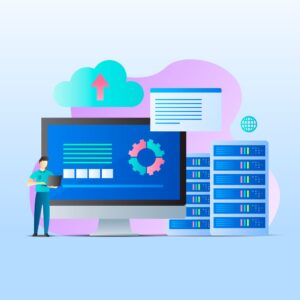ERP (Enterprise Resource Planning) software is one of the fastest-growing technologies and is becoming an essential tool for organizational management. In fact, 47% of companies globally leverage ERP applications to manage their business operations (ecisolutions.com).
If you feel overwhelmed by the plethora of options available in the software market, let’s explore two of the most adaptable, feature-rich, all-in-one ERP solutions that can easily manage every aspect of your business processes: NetSuite and SAP ERP. Both are leading contenders in the enterprise resource planning software market.
We aim to provide a comprehensive comparison of NetSuite ERP vs. SAP ERP, discussing the key considerations and requirements for implementing these systems in your business.
NetSuite Vs SAP: The Basics
NetSuite and SAP, both ERP leaders, are designed to streamline business processes across various industries, including inventory management, financials, and CRM. Although both are excellent ERP solutions for small businesses and large enterprises, they possess some similarities as well as glaring differences that potential users should be aware of.
In general, SAP provides both on-premises and cloud-based solutions, offering extensive customization options that can accommodate highly complex business processes. This flexibility makes SAP a suitable choice for large enterprises with intricate and specific operational needs. In contrast, NetSuite operates entirely in the cloud, which simplifies deployment and access. NetSuite is renowned for its user-friendly interface and streamlined implementation process, making it an attractive option for businesses seeking a straightforward and scalable ERP solution.
Additionally, while SAP’s extensive features and customization capabilities can be advantageous, they often require substantial time and resources to implement and maintain. NetSuite, with its cloud-native architecture, offers a more agile approach, allowing businesses to quickly adapt to changing market conditions without the need for extensive IT infrastructure.
Understanding the strengths and limitations of each system is crucial for businesses looking to invest in an ERP solution. This comparison will delve deeper into the specific features, pricing, and overall benefits of NetSuite and SAP to help you determine which ERP system is the right fit for your business needs.
NetSuite ERP: The Cloud-First Challenger
NetSuite ERP is the fastest-growing cloud-based solution which caters for every small to medium-sized business needs with its suite of tools for finance, HR, CRM, and e-commerce.
Furthermore, NetSuite’s cloud-based nature ensures that businesses can access their ERP system from anywhere with an internet connection, promoting remote work and collaboration. The robust security measures in place also ensure that sensitive business data is protected at all times.
NetSuite ERP stands out as a versatile and scalable solution for small to medium-sized businesses, providing a wide range of tools and features to support finance, HR, CRM, and e-commerce operations. Its ease of use, real-time insights, and integration capabilities make it a powerful tool for driving business growth and efficiency
What NeSuite ERP excels at:
Speed and agility: As a cloud-based solution, NetSuite is renowned for its rapid implementation and scalability. This agility means that as your business grows and evolves, NetSuite can effortlessly adapt to meet your changing needs, providing a flexible and dynamic solution that scales with your operations.
User-friendliness: NetSuite features an intuitive interface designed to enhance user experience. Its user-friendly design ensures that employees can quickly adapt to and efficiently use the system.
Comprehensive functionality: While primarily targeting SMBs, NetSuite ERP features can handle the complexities of ever-evolving businesses. From advanced financial management and robust HR capabilities to sophisticated CRM and e-commerce tools, NetSuite offers a holistic solution that covers all critical aspects of business operations.
Real-Time Visibility: NetSuite provides real-time data and analytics, offering businesses valuable insights into their operations. This real-time visibility helps in making informed decisions quickly, optimizing performance, and identifying opportunities for improvement.
Integration Capabilities: NetSuite excels in its ability to integrate with other essential business tools and software, ensuring a seamless flow of information across different systems. This reduces data silos and enhances overall operational efficiency.
Global Reach: With multi-currency, multi-language, and multi-subsidiary capabilities, NetSuite is well-suited for businesses with global operations. It supports international business processes and compliance requirements, making it an excellent choice for companies operating in multiple countries.
NetSuite benefits:
- Automate all aspects of your business operations
- Offer customizable view of relevant KPIs
- Offer quick, intuitive mobile access
- Effortless integration with existing software
- High customization available
- Quick and one-click mobile access
- Real-time insights of data view
It’s essential to note that while NetSuite has made significant strides in providing robust ERP solutions, it might not be the best fit for large enterprises with highly complex operations or specific industry requirements. Large enterprises often have intricate and specialized needs that demand extensive customization and integration capabilities, areas where more established and traditionally robust systems like SAP may excel.
In conclusion, while NetSuite offers numerous benefits, including rapid implementation, user-friendly interfaces, and comprehensive functionality, businesses must carefully assess their specific needs and operational complexities to determine the most suitable ERP solution. For some large enterprises, the depth and flexibility of a system like SAP may better meet their demands.
What is SAP ERP: The Industry Veteran
SAP is a powerful and robust name in the ERP world. With decades of expertise and a vast customer base, SAP has established itself as a leader in delivering comprehensive and industry-centric ERP solutions. Its extensive experience in the field enables SAP to offer tailored solutions that address the unique challenges and requirements of various industries.
SAP’s strength lies in its ability to provide highly customizable and scalable ERP systems that can manage complex business processes and support large enterprises with diverse operational needs. The platform’s modular architecture allows businesses to implement specific modules that cater to their industry-specific demands, whether it’s manufacturing, retail, healthcare, or any other sector.
Overall, SAP’s industry-specific solutions, extensive customization capabilities, and strong support network make it a preferred choice for large enterprises with complex and specialized requirements. Its proven track record and commitment to innovation ensure that businesses can rely on SAP to drive efficiency, agility, and growth in their operations.
Key strengths
Customization: SAP’s great degree of adaptability enables companies to configure the system to meet their unique requirements. This flexibility is especially helpful for big businesses that have intricate workflows.
Industry-specific solutions: SAP provides sophisticated functionality catered to specific business difficulties through specialized modules for a range of industries, including manufacturing, retail, and healthcare.
Global reach: SAP’s global presence and support network can be a big advantage if you operate in numerous countries. With capabilities to handle multi-currency transactions, multi-language interfaces, and compliance with various international regulations, SAP ensures that businesses can seamlessly manage their global operations.
SAP ERP solutions or benefits for our business:
- Effortless complete business department management
- Access to business intelligence and analytical tools
- Cater SMEs to take better control of their business
- Indirectly access data through SAP
- Intuitive and interactive user interface
- On-premises solutions
Compared to NetSuite, SAP can be more expensive and requires longer implementation timeframes, while having a superior feature set. The higher cost and longer deployment periods are often justified by SAP’s ability to handle highly complex and specialized business processes, making it a preferred choice for large enterprises with intricate operational requirements. SAP’s extensive customization options allow businesses to tailor the system precisely to their needs, ensuring optimal performance and alignment with specific workflows.
In essence, while SAP’s higher cost and longer implementation timeframes might be a barrier for some, the investment can deliver significant returns through enhanced operational capabilities, customized solutions, and industry-specific advantages that can drive long-term success. Lets look at the comparison in one shot in the table below.
NetSuite vs SAP: How Do They Compare?
| Feature | NetSuite ERP | SAP (SAP Business One, S/4HANA) |
| Target Market | Primarily SMBs, scaling to mid-market | SMBs to large enterprises |
| Deployment Model | Cloud-based | Cloud and on-premises |
| Core Functionality | Financials, CRM, ERP, e-commerce | Financials, HR, supply chain, manufacturing, etc. |
| Industry Focus | Retail, e-commerce, professional services | Diverse industries with specialized modules |
| User Interface | Cloud-native, user-friendly | Varies by module and version |
| Implementation Time | Generally faster due to cloud-based nature | Can be longer, especially for on-premises implementations |
| Cost | Typically, lower total cost of ownership | Can be higher, depending on modules and customization |
| Scalability | Good for growing businesses | Highly scalable for large enterprises |
| Customization | Moderate customization options | Extensive customization capabilities |
| How to license | Direct or through partner | Partner only |
| Product maturity (years) | 24 | 14 |
| Target industries | Retail & Ecommerce
Financials Services Advertising, Media & Publishing Trans |



